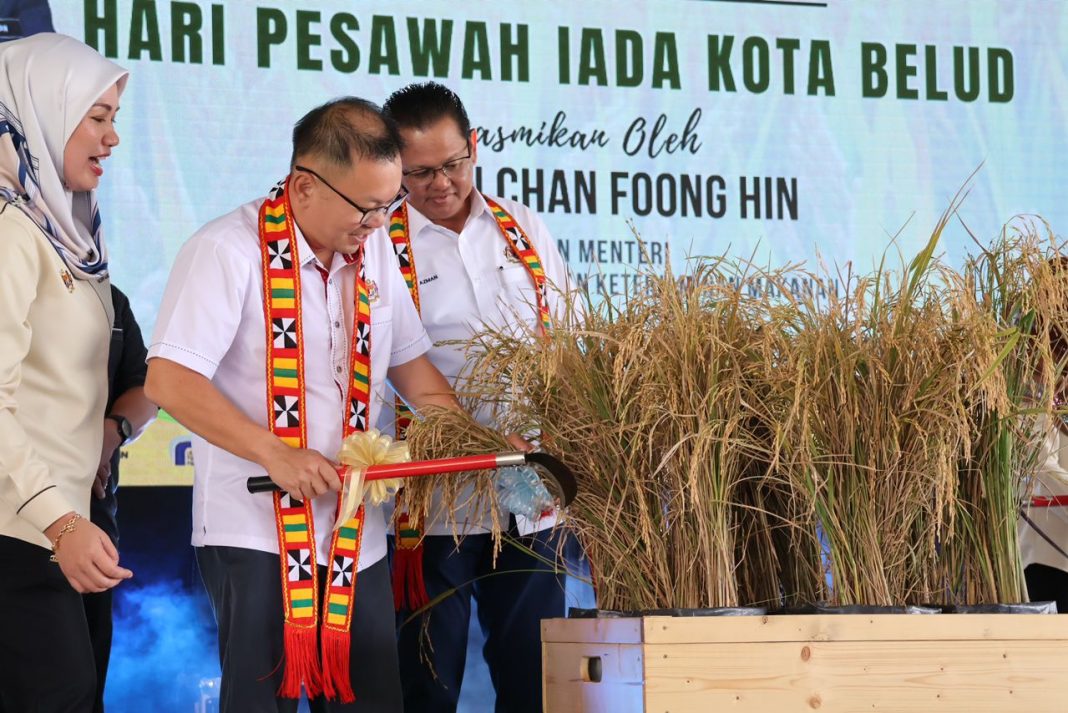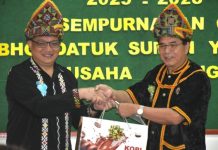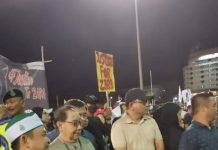KOTA BELUD: Deputy Minister of Agriculture and Food Security Chan Foong Hin in a statement today said that the Large-Scale Smart Paddy Field (SBB SMART) Programme implemented by the Malaysian Federal Ministry of Agriculture and Food Security (MAFS) will help increase the rice production in Sabah.
This increases not only the income of farmers, but also increases the self-sufficiency level (SSL) of rice in Sabah, basically killing two birds with one stone.
Chan said so during a two-day working visit to the Kota Belud Integrated Agricultural Development Area (IADA) on Thursday (16 February). In the working visit trip, Chan visited Sri Dusun, the largest Rice factory in Sabah and also BERNAS’s Rice Storage Warehouse. Also present during Chan’s visit was MAFS’s Paddy and Rice Regulatory Division director-general Azman Mahmood, the Director of IADA Kota Belud Norfaine Sameun and other heads of MAFS agencies in Sabah.
Chan said under the SBB SMART Programme, MAFS shall engage in a strategic collaboration with leading companies in the private sector. Chan explained that working together with these companies, local rice farmers will have their rice yield and quality improve, especially when compared with when farmers cultivate and work on the rice fields alone. These companies will be expected to provide machineries, such as tractors, and technological assistance, such as drones, to assist with farmers’ planting of paddy according to their schedule of work. Through this SBB SMART Programme, farmers will be able to manage their paddy fields in a team under a more systematic manner.
“At the national level, a total of 27 companies have participated in this SBB SMART Programme in ten states, with a total of 5,000 farmers participating and more than 11,000 hectares of rice fields. In Kota Belud, 40 farmers (Jawi-Jawi Scheme) had participated, and the result was good with the average rice yield having increased from 2.6 metric tons per hectare to 4.15 metric tons per hectare,” said Chan.
The SBB SMART Programme in the Jawi-Jawi Scheme has reached a total area of 126.78 hectares in 2023 – this is an increase of 153.6% compared to an area of 50 hectares back in 2022.It is also reported that the income of farmers from rice paddy harvest of around RM2,000 in the previous harvest season has increased to RM6,000 this season.
“Based on current records, Sabah’s rice self-sufficiency level (SSL), as of 2021, is only 22.8%, while the national average is 65%,” said Chan.
Chan said that the government intends to achieve the target of 75% rice self-sufficiency level (SSL) by 2025 as outlined under the National Agro-Food Policy (DAN) 2.0 and the Twelfth Malaysia Plan (RMK12).
“As it can be seen, we still have a lot of work to do in order for Sabah to achieve the target under the DAN 2.0. I hope that the co-operation with these leading companies in the private sector under the SBB SMART Programme will be the starting point for a change in the landscape of the local paddy and rice industry in Sabah.” said Chan.
Chan said that MAFS is mulling to bring in new varieties of MR297 and MRQ 74 paddy seeds from Peninsula Malaysia to Sabah to expand the Large-Scale Smart Paddy Field (SBB SMART) Programme here.
“The introduction of the two popular paddy seed varieties was aimed at increasing the self-sufficiency level (SSL) of Sabah. The effort will also increase the income of local rice farmers. The MR 297 variety can produce an average rice yield of up to 10 metric tons per hectare, whereas the MRQ 74 variety has an average yield potential of 5 metric tons per hectare. These two varieties can overcome the problem of spontaneous shattering by weedy rice (padi angin) which led to high yield losses and are able to increase rice farmers’ income to more than 20% with the increase in rice production,” said Chan.
However, MAFS will be discussing with its counterpart at State, the Ministry of Agriculture, Fishery and Food Industries, on the introduction of new paddies varieties. “We will always respect state’s decision”, said Chan.-pr.BNN






